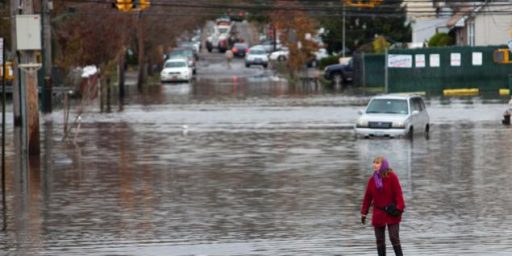Hurricanes and Distributed Generation
Here is an interesting article on how people in Florida are buying more generators as a way of reducing the problems of hurricanes and power outages.
Retailers say portable generators continue to sell, but they have noticed the trend toward permanent models, which can be twice the size of an outdoor air conditioning unit.
Before the hurricanes, one Home Depot store west of West Palm Beach would sell about five of the models in a year, managers said. In the four months since Hurricane Jeanne struck, the store has sold about 30.
Since Jeanne, county officials have processed about a dozen permit requests a week for standby generators for existing homes or for new construction, said Rebecca Caldwell, county building supervisor.
Before the hurricanes, a couple of requests would come through every couple of months, she said.
The issue of distributed generation (where the generations is distributed vs. centralized, hence the term) can be fairly complex. For example, are the people intalling the generators going to using their generators for standby purposes (i.e., power outages or to reduce the overall usage from the utility) in which case their generator will be operating in parallel with the grid, or are they going to be grid independent? Grid independent is probably the easiest in terms of interconnections, but if something happens to your generator your out of luck until you get somebody to fix it. Operating in parallel to the grid would allow the customer to have a back up supply of energy or shave off a chunk of their usage, but there is the additional issue of connecting to the grid.






What? The thought that a home owner could co-generate cost effectively is just stupid.
The issue of distributed generation (where the generations is distributed vs. centralized, hence the term) can be fairly complex.
No, it really is quite simple.
For example, are the people intalling the generators going to using their generators for standby purposes (i.e., power outages or to reduce the overall usage from the utility) in which case their generator will be operating in parallel with the grid, or are they going to be grid independent?
Why is that complex??? It is self-evident that they can either use it as back-up or co-generate.
But it also evident to anyone who can do rudimentary arithmetic that co-generation at the home level is not economically feasible and really has no part of this discussion.
Indeed, the article you link highlights the problem of the home owner’s unit not even being large enough to handle the whole home! How can they co-gen?
Grid independent is probably the easiest in terms of interconnections, but if something happens to your generator your out of luck until you get somebody to fix it.
What a profound statement. It is easier to install without the grid. That is completely irrelevant. Whole house units are clearly going to be installed by qualified electricians, they can handle it.
You have effectively said that building cars would be easier if you didn’t have to install the brakes. A statement that is factually true but completely stupid.
Operating in parallel to the grid would allow the customer to have a back up supply of energy or shave off a chunk of their usage, but there is the additional issue of connecting to the grid.
Which is completely trivial to an electrician.
It is complex in that it would impact on the utilities which are regulated. Bringing in the regulators, even for something simple like tying one’s shoes, complicates it tremendously. Also, there are other issues, such as pollution that can make it complicated.
Do try to think before posting Paul.
what Home Depot is selling is small generators suitable for running six or seven circuits and which automatically cut you off from the grid and come on when power is lost. Fuel can be diesel or natural gas from your home gas connection.
power generated this way is lots more expensive than power plant power, people will only use it till the central supply comes back
It is complex in that it would impact on the utilities which are regulated.
That is laughable. You clearly have no clue what you are talking about.
Read your own link… The guy spent $13,500 for the genset. THEN he needs to install a 500 gallon below ground LP tank… That costs him about 7,500. (before the LP to fill it) he is at over $20,000 capital expense even before he pays for installation or even thinks about fuel.
Even if you consider his electric bill to be 200 per month EVERY SINGLE MONTH, he needs to run it over 100 months (8.75 years) to break even. (with no fuel costs and BTW the fuel cost alone make this a no go)
The service life on one of those little units is about 36 months of run time. Forgetting fuel, he can never get back the capital expense.
AND even at $13,000 the unit can not meet his present load, much less future load.
THIS WILL NEVER BE USED TO AVOID PAYING THE ELECTRIC COMPANY.
You keep trying to pretend it will be. Either you are delusional or an idiot. BTW- I’ve thought about this at length… I’ve had them installed you knuckehead!!!
You clearly have no clue what you are talking about.